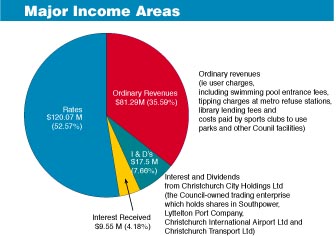| The Christchurch City Council Draft Plan 1998 features the introduction of a new
funding policy for Christchurch. As Council corporate planner Rex Harrison explains, the Council is examining how it funds the services it provides for residents and ratepayers. "Each Council service from the Art Gallery to waste collection and disposal to city streets to parks to festivals to water supply to the library, and many others was analysed. A working group of Councillors determined how much direct benefit each service provided to individuals in Christchurch and how much general benefit it provided to the community as a whole. "The legislation implies that unless there are good reasons, direct benefits should be funded from user charges for example, from library fees, swimming pool entrance charges or tipping fees at metro refuse stations. However the Council can allocate some, or even all, of the costs of providing direct benefits to ratepayers rather than to users. It can do this if it would be in the community interest, would be necessary for fairness and equity, or if Council policy is better served by rating than direct charging. "The final step is to split the costs that are to be funded by rates between the four ratepayer groups commercial, residential, institutional and rural to determine what rates revenue is required from each," he said. |
The Council is |
More detail on this complex process is included in the Draft Plan.
The findings of the working group were published for public consultation in September last year as a report entitled 'Rates or User Charges Your City, Your Choice'. The public response to that booklet was used when preparing the present Draft Funding Policy.
Compared to rates paid last year, the impact of the Draft Policy as it currently stands will be as follows:
As Rex Harrison explains, the changes are a result of a complex combination of factors.
"Commercial ratepayers have been allocated a higher percentage of the cost of maintaining and developing city streets, which has contributed to their rates increase; residential ratepayers receive slightly more benefit across the board than had previously been recognised, which accounts for their increase; while rural ratepayers have been allocated less costs for water supply and city streets than the other sectors, which contributes to their slight reduction," he said.
| Costs for
institutional ratepayers have decreased because the major
institutions pay a direct charge for water supply, waste
disposal and sewerage, meaning the cost of the general
benefit of those services to institutions as a sector is
less than previously calculated. For further information, or to have your
say on the draft funding policy, consult the Christchurch City Council Draft Plan 1998, or call 941 8888. |
 |